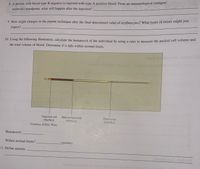
Human Anatomy & Physiology (11th Edition)
11th Edition
ISBN: 9780134580999
Author: Elaine N. Marieb, Katja N. Hoehn
Publisher: PEARSON
expand_more
expand_more
format_list_bulleted
Question
Can you help with number 8
This is not and will not be graded

Transcribed Image Text:OEEN
8. A person with blood type B negative is injected with type A positive blood. From an immunological (antigen/
antibody) standpoint, what will happen after the injection?
9. How might changes in the pipette technique alter the final determined value of erythrocytes? What types of errors might you
expect?
10. Using the following illustration, calculate the hematocrit of the individual by using a ruler to measure the packed cell volume and
the total volume of blood. Determine if it falls within normal limits.
Clay/red cell
interface
Red cell/plasma
interface
Plasma/air
interface
Courtesy of Eric Wise
Hematocrit:
Within normal limits?
(yes/no)
11. Define anemia.
Sol
2u ill oloso
Expert Solution
arrow_forward
Step 1
- Blood is a fluid connective tissue composed of plasma and the formed elements. Blood is derived from the lateral plate of the mesoderm which is 4 times highly viscous than water.
- The formed elements consists of erythrocytes (RBC), leucocytes (WBC), thrombocytes (platelets).
- The difference in the blood group are categorized according to the presence of surface antigens and antibodies (in blood plasma).
- Based on the ABO blood grouping system four types of blood groups are classified namely A,B, AB or O.
- The A and B groups contain only A and B surface antigens respectively.
- The AB blood group contains both A and B surface antigens and O blood group does not contain any of the surface antigens.
- The type of blood group of a person is inherited from the parents.
- The blood groups are not compatible among themselves and a fata reaction occurs in the case of mixture of incompatible blood groups.
Trending nowThis is a popular solution!
Step by stepSolved in 2 steps

Knowledge Booster
Similar questions
- Please help with all parts of this question. Ensure to double and triple check your answers bc I have an exam and I will be using this as my study guide so obviously I don't want to study wrong.arrow_forwardWhat do you mean by fraternal twins?arrow_forwardPlease Help me fill out crossword puzzle so I can have a visual copy of what it looks like , just don’t answer but fill it out the sheetarrow_forward
- Twins may or may not be identical. Comment.arrow_forwardI really need help with this queshtion please and an explnation and pleas show me how you got itarrow_forwardCan you please show me how to do a dihybrid with the following genes and show me the pun and square table with the phenotype and genotypes and how you found them? AABB *aabbarrow_forward
- Please label and state the functions.arrow_forwardPlease help me to answer this questionpart 1-7. in very short and specific answer. doesnt have to go very detail.just answer the question as asked, thank you so much 1. Identify one particular spinal reflex with which you are familiar through personal experience (eg you did something before you realized consciously why). 2. Describe the experience you had with this spinal reflex 3. The specific location and function of the receptor 4. Indicate the afferent and efferent neurons from start to finish. 5. Indicate the location of any synapses along the way. 6. Finally indicate the specific effectors involved including any muscles, joints, bones and/or other organs. 7. Estimate using metric units, the distance this signal travelled from start to finish.arrow_forwardDescribe the consequences of a lack of the blood–testis barrier. Please, it is appreciated the answer on your own words, no copy or paste, thank you.arrow_forward
arrow_back_ios
SEE MORE QUESTIONS
arrow_forward_ios
Recommended textbooks for you
 Human Anatomy & Physiology (11th Edition)Anatomy and PhysiologyISBN:9780134580999Author:Elaine N. Marieb, Katja N. HoehnPublisher:PEARSON
Human Anatomy & Physiology (11th Edition)Anatomy and PhysiologyISBN:9780134580999Author:Elaine N. Marieb, Katja N. HoehnPublisher:PEARSON Anatomy & PhysiologyAnatomy and PhysiologyISBN:9781259398629Author:McKinley, Michael P., O'loughlin, Valerie Dean, Bidle, Theresa StouterPublisher:Mcgraw Hill Education,
Anatomy & PhysiologyAnatomy and PhysiologyISBN:9781259398629Author:McKinley, Michael P., O'loughlin, Valerie Dean, Bidle, Theresa StouterPublisher:Mcgraw Hill Education, Human AnatomyAnatomy and PhysiologyISBN:9780135168059Author:Marieb, Elaine Nicpon, Brady, Patricia, Mallatt, JonPublisher:Pearson Education, Inc.,
Human AnatomyAnatomy and PhysiologyISBN:9780135168059Author:Marieb, Elaine Nicpon, Brady, Patricia, Mallatt, JonPublisher:Pearson Education, Inc., Anatomy & Physiology: An Integrative ApproachAnatomy and PhysiologyISBN:9780078024283Author:Michael McKinley Dr., Valerie O'Loughlin, Theresa BidlePublisher:McGraw-Hill Education
Anatomy & Physiology: An Integrative ApproachAnatomy and PhysiologyISBN:9780078024283Author:Michael McKinley Dr., Valerie O'Loughlin, Theresa BidlePublisher:McGraw-Hill Education Human Anatomy & Physiology (Marieb, Human Anatomy...Anatomy and PhysiologyISBN:9780321927040Author:Elaine N. Marieb, Katja HoehnPublisher:PEARSON
Human Anatomy & Physiology (Marieb, Human Anatomy...Anatomy and PhysiologyISBN:9780321927040Author:Elaine N. Marieb, Katja HoehnPublisher:PEARSON

Human Anatomy & Physiology (11th Edition)
Anatomy and Physiology
ISBN:9780134580999
Author:Elaine N. Marieb, Katja N. Hoehn
Publisher:PEARSON

Anatomy & Physiology
Anatomy and Physiology
ISBN:9781259398629
Author:McKinley, Michael P., O'loughlin, Valerie Dean, Bidle, Theresa Stouter
Publisher:Mcgraw Hill Education,

Human Anatomy
Anatomy and Physiology
ISBN:9780135168059
Author:Marieb, Elaine Nicpon, Brady, Patricia, Mallatt, Jon
Publisher:Pearson Education, Inc.,

Anatomy & Physiology: An Integrative Approach
Anatomy and Physiology
ISBN:9780078024283
Author:Michael McKinley Dr., Valerie O'Loughlin, Theresa Bidle
Publisher:McGraw-Hill Education

Human Anatomy & Physiology (Marieb, Human Anatomy...
Anatomy and Physiology
ISBN:9780321927040
Author:Elaine N. Marieb, Katja Hoehn
Publisher:PEARSON